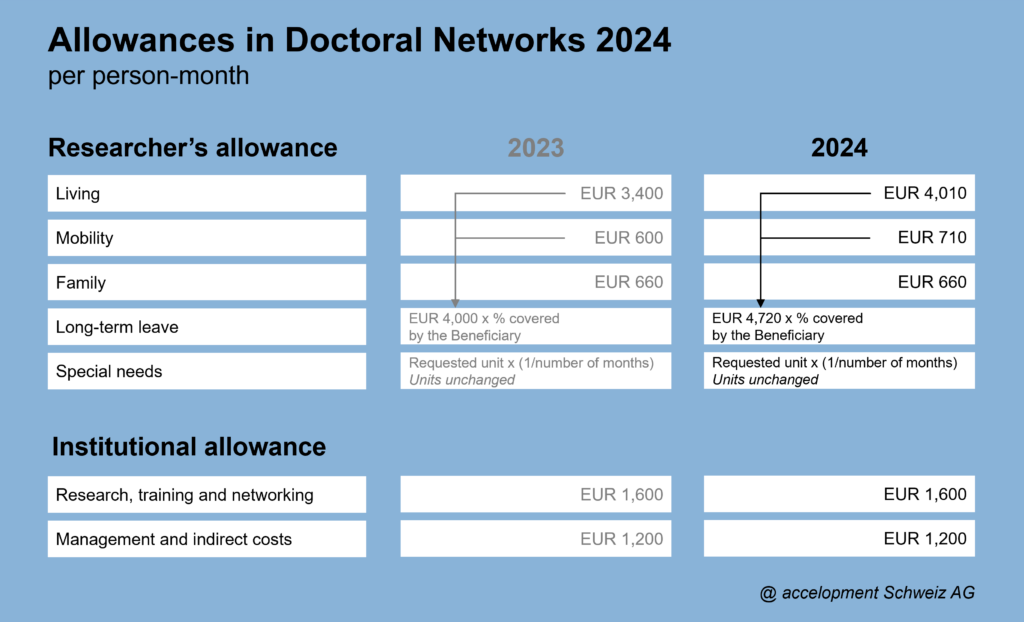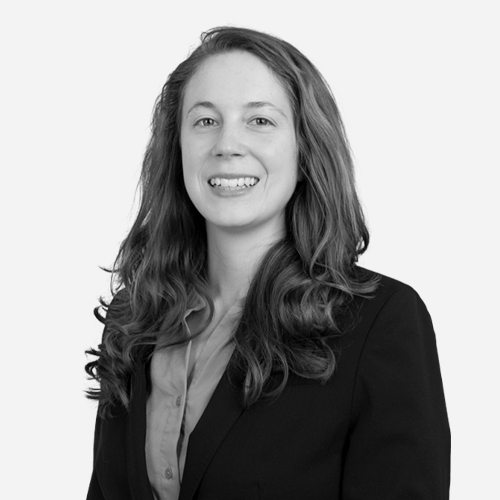MSCA 2024 Doctoral Networks call – essential updates for applicants
27th May 2024 at 4:12 pm
The call for the 2024 Marie Skłodowska-Curie Actions (MSCA) Doctoral Networks (DN) is expected to open on 29 May 2024. As the updated MSCA Work Programme, Guide for Applicants and revised Standard Proposal Template are now available; we had a look at what has changed since 2023 so you can get a flying start with your proposal preparation.
Work Programme – higher allowances for the doctoral candidates
The revised MSCA Work Programme 2023-2025 was adopted at the end of April 2024. The changes to the previous version (2023-2024) are related primarily to budget and finances. Notably, the EC increased the indicative budget for the Doctoral Networks from 451.15 million euros to 608.6 million euros. This budget increase will likely not lead to a higher success rate, as some of the allowances and almost all of the country correction coefficients were also increased due to the rise in the cost of living.

Unfortunately, the institutional unit contributions were not increased, meaning that the project budgets to perform research remain challenging at least in some scientific areas where costly experiments are the norm.
Guide for Applicants – some new clarifications
Nothing much seems to have changed in the Guide for Applicants (GfA). The key rules for the Standard DNs, Industrial Doctorates (DN-ID) and Joint Doctorates (DN-JD) remain unchanged. It is worth noting that a major change last year was the extension of the maximum fellowship duration to 48 months and the maximum project duration to 60 months for the DN-JD. While the definition of the DN-JDs in the new GfA has been redrafted for clarity, the mode remains the same.
The new GfA further provides a more detailed clarification of the resubmission restrictions approach. The rule remains that proposals which scored below 80% in the previous year’s call may not be resubmitted in the following year. Furthermore, any resubmissions need to be indicated as such in the administrative forms of the proposal Part A. The GfA now further states that any proposal with a score of 70% or more of the same recruiting organisations as in another proposal submitted in 2023, will be assessed regarding resubmission eligibility, irrespective of the mandatory self-declaration.
A novelty in the GfA concerns the restrictions regarding the protection of European communication networks, according to which entities assessed as high-risk suppliers of mobile network communication equipment and any entities they own or control are not eligible to participate as beneficiaries nor associated partners. Most networks will not be affected, but consortia working in areas such as 5/6G will want to take extra care in the selection of their network partners.
Standard proposal template – moving sections
Seasoned DN applicants will see that the standard proposal template for the 2024 DN call also includes limited changes. Those primarily affect Part B1 of the proposal, where some required sub-headings have been adapted or newly included.
| Item | 2023 | 2024 |
| Quality of the supervision arrangements (section 1.4) | – | New heading specifically for standard DNs: Quality of the supervision arrangements for DN (no change for IDs and JDs) |
| Recruitment strategy | Required sub-heading under section 3.1 | Now section 4 in Part B2 |
| Commitment of partners | Required sub-heading under section 3.2: “Commitment of beneficiaries and associated partner to the programme” | Redrafted sub-heading under section 3.2: “Commitment of associated partner to the programme” – Beneficiary commitment does no longer have to be explained |
Furthermore, some annotations have been revised and are worth a thorough read. Lastly, the Standard Proposal Template (Parts B1 and B2) now includes guidance on the use of generative AI tools for the preparation of the proposal and requests that any sources used to generate content and citations, including those generated by AI, be indicated in the proposal itself.
How to start your DN proposal journey
Whether you are planning to submit a new or resubmit a previously unsuccessful proposal to this year’s DN call, make sure that you have the necessary documents ready and regularly check the call on the EU Funding & Tenders Portal for important updates. You may also want to subscribe to our blog updates in the main area of our blog, as we regularly publish blog posts on Doctoral Networks and other Horizon Europe funding topics. As an associated partner in seven ongoing Horizon Europe DNs, DarChem, MobiliTraIN, BREAKthrough, CONCISE, MITGEST, MIRELAI and SYNSENSO, as well as many successful H2020 ITNs, we at accelopment have gathered a great deal of practical experience in Proposal Writing, Project Management and Dissemination support as well as Transferable Skills Training all geared toward DNs. If you are interested in our support for your upcoming DN proposal, feel free to contact us.

Jacqueline Strehler
Research & Innovation Project Manager

Dr. Jörn-Frederik Wotzlaw
Research & Innovation Project Manager
